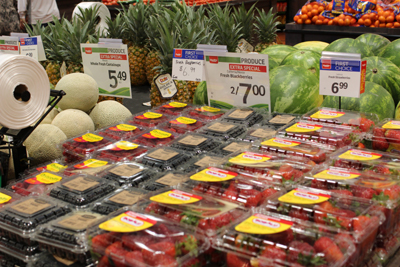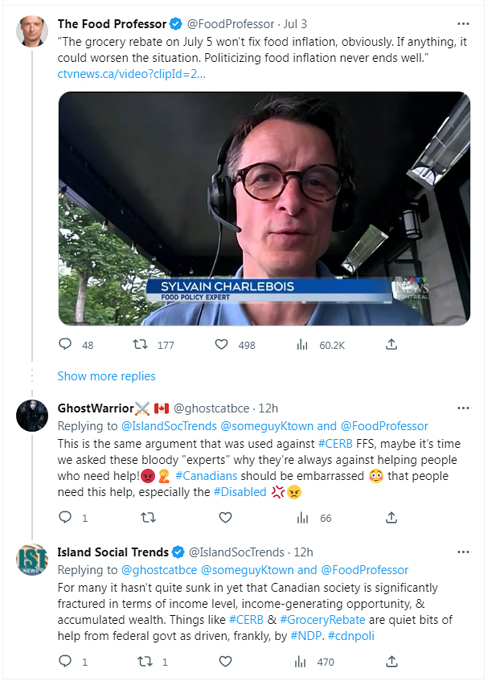
Wednesday July 5, 2023 | VICTORIA, BC
by Mary P Brooke | Island Social Trends
NEWS SECTIONS: ECONOMY | POLITICS | FOOD SECURITY
Low-income Canadians who are already receiving the GST rebate will today receive a doubling of that credit. It’s been branded as the ‘grocery rebate’ but the funds can be spent on anything.
Most people who are below the income threshold for this government assistance ($38,000/year for a couple or $32,000 for an individual) will automatically receive the payment by direct deposit or cheque.
The grocery rebate will be equivalent to double the GST/HST credit amount a person received in January 2023, says Revenue Canada.
How it’s calculated:
The amount is calculated based on the family situation in January 2023 and 2021 adjusted family net income.
You could receive a maximum payment of up to:
If you are single
- $234 (no children)
- $387 (with 1 child)
- $467 (with 2 children)
- $548 (with 3 children)
- $628 (with 4 children)
If you are married or have a common-law partner
- $306 (no children)
- $387 (with 1 child)
- $467 (with 2 children)
- $548 (with 3 children)
- $628 (with 4 children)
A helping hand:
The so-called ‘grocery rebate’ is a socially-conscious financial support for low-income Canadians. The federal government has not said it will ‘fix food inflation’ (as some critics have purported), but will lend a helping hand.
Regarding the challenge that the additional funds will somehow worsen inflation is to be unaware of the severe hardship that many Canadians households find themselves in. “Being targeted to low-income it won’t worsen inflation, though it might help people pay some essential bills,” said Island Social Trends on Twitter yesterday.
Today’s social assistance has been finely tuned for receipt only by those who can barely make ends meet (if at all). Most of those folks won’t be spending a few hundred extra dollars on anything but basic survival. That’s hardly inflationary; it’s about keeping people afloat.

For many it hasn’t quite sunk in yet that Canadian society is significantly fractured in terms of income level, income-generating opportunity, and accumulated wealth. Things like the CERB payments during COVID & the grocery rebate this year (after a grinding period of nearly two years of unrelenting inflation) are quiet bits of help from federal government.
Pushing up food prices:
Factors which have contributed to what has been nearly an unrelenting increase in grocery prices over the past two years include the supply chain and labour interruptions of the pandemic, supply chain interruptions due to the war in Ukraine (and now with the strike at the Port of Vancouver), and the use of strident interest rate hikes by the Bank of Canada since March 2022. | Food Security News Section
Political dynamics:
The driver behind this type of support has been the federal NDP, which has put pressure on the Liberal government to recognize the real need out there.
Trudeau and his cabinet seem aware of the need; it’s been their job to find a delivery mechanism that is palatable to those whose tax dollars help fund this support to low-income Canadians.
All of this should continue to discuss about the role of a basic income for Canadians who find themselves short-changed by the system.
===== ABOUT THE WRITER:
Mary P Brooke has been covering news of the west shore region of south Vancouver Island since 2008. Her publication series has covered news of the day through broader socioeconomic and political insights in the region: MapleLine Magazine (2008-2010), Sooke Voice News (2011-2013), West Shore Voice News (2014-2020), and Island Social Trends (since 2020).
Since 2014, Ms Brooke has attended nearly every SD62 board and committee meeting. With that depth she has served the community with a deeper understanding of the school district. In October 2022 she was a trustee candidate in the Belmont Zone of SD62 (Langford, Highlands, Colwood and Metchosin) in an effort to parlay her insights about SD62 to the broader community.
The Island Social Trends print edition (previously West Shore Voice News) launches later in July 2023, after a 3-year hiatus during the pandemic years. The print-bound copies of MapleLine Magazine, Sooke Voice News and West Shore Voice News are already part of the permanent collections at the Sooke Region Museum.
This year, Mary P Brooke has been nominated for the Jack Webster Foundation Shelley Fralic Award to recognize a professional woman journalist whose journalism makes a contribution to the community. She holds a B.Sc. in foods and nutrition (with majors in community education and sociology) and the Certificate in Public Relations.





